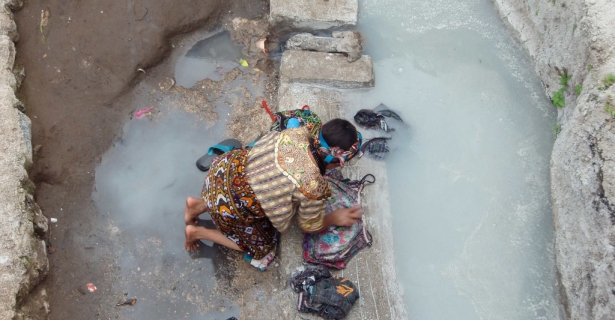Sonja Kytomaa will be a junior this coming fall, majoring in Biopsychology, and is a member of Tufts Timmy.
Along with two other students from Tufts, Victoria and Alejandra, I spent a majority of May and the beginning of June in Quetzaltenango, Guatemala. Nearly every aspect of our trip involved water in one way or another, making for a very wet three weeks. First off, we were there at the beginning of rainy season, which meant rain showers every afternoon, without fail. Another, perhaps more important, way in which water became a defining feature of our trip was as the focus of our project.
The goal of our project was to increase access to clean, safe, water in the rural communities of Guatemala. More specifically, our project consisted of two parts. In the first part we interviewed 11 women from La Victoria (a small town about an hour away from Quetzaltenango), about their knowledge, attitudes and practices surrounding water, sanitation and hygiene. We also aimed to get a sense of what the women wanted in terms of filters and clean water based on what they would use it for and their priorities, rather than simply telling them what to do.
The second part consisted of teaching students in an afterschool program run by Pop Wuj, the Spanish school we took classes with, about the solar disinfection method, also known as SODIS. SODIS is a simple way of killing nearly all of the bacteria in untreated water, helping prevent diarrheal disease and parasites. It essentially consists of leaving a PET water bottle (in other words, a majority of water bottles sold in stores), filled with untreated water out in the sun for 6 hours, or two days if the sky is mostly cloudy. Multiple studies have proven its effectiveness, however we still wanted to confirm that it would work in this particular setting. Alejandra packed with her a set of water testing kits, so we conducted an experiment to see how efficacy of SODIS and evaluate the best method for cleaning water bottles.
The results from both parts were promising, and very interesting. From the interviews, we got the general impression that the women had a solid understanding of good practices concerning sanitation, hygiene and the importance of clean water. However, they continue to face multiple barriers. The barriers included cost as well as the size of filters offered to them. That led us to believe that implementing the SODIS method in La Victoria as a supplemental water source could be an effective next step.
Unfortunately, with the limited time we had in Guatemala, we were unable to follow through with teaching the children in the afterschool program about SODIS personally or begin implementing it in La Victoria. However, we were able to talk to the coordinator of the afterschool program, and drew up a poster explaining the process. Even though it is far from ideal to be unable to be more directly involved with every aspect of the project, I think that this might have been a blessing in disguise. Hearing these lessons from the coordinator, who the students see nearly every day and have known for much longer than us might have worked in our favor, making them more open to learning and adopting this new method. This situation speaks to an aspect of community health that I love. It is not an individual field, but out of necessity requires collaboration and working with others in order to accomplish our goals.
Even though our time in Guatemala showed us that there is still much to do, I returned to Boston with a sense of accomplishment knowing that it was all a step in the right direction and will help shape our future efforts when we return in the (hopefully) near future!

